- Home
- Brenda Janowitz
The Grace Kelly Dress Page 11
The Grace Kelly Dress Read online
Page 11
“Soda water, please.”
“She’ll take one of these, too,” Jesse said, as the bartender poured him a shot of whiskey.
“I don’t drink.”
“Would you like a glass of milk, then?”
“Are you making fun of me for not drinking?”
“I’m just messing around with you. You like to mess around?” He wrapped a finger around one of Joanie’s curls. Joanie lost her breath for a moment, and then remembered herself.
“I’m engaged.”
“I don’t care.”
“I said I’m engaged,” Joanie repeated, this time flashing her two-carat engagement ring as proof.
“I said I don’t care,” Jesse said, offering a devilish smile. “Do you?” Joanie couldn’t help herself from smiling. Her smile gave way to a giggle, and she found she couldn’t quite stop. She covered her mouth with her hand.
“She’s trying to tell you that she’s not interested, Jesse,” said a voice behind him. “Gimme your seat, you’re back on in five minutes anyway.”
“Have you seen my sister?”
“She’s in the, uh, bathroom.”
“Sure she is,” he said, his face falling. And then, to Joanie, plastering a smile back on: “I’ll be seeing you soon.”
“I apologize for my friend’s brother,” the girl said, taking the seat next to Joanie. She had bleached white hair with red tips. “He’s used to girls falling at his feet.”
“It’s fine. This night is a total disaster anyway.”
“Do I know you?”
“I don’t think so. I’ve never been here before.”
“You just look so familiar.”
“Joanie?”
Joanie turned around and there she was. The unmistakable black mohawk. The ear full of piercings, the delicate silver hoop at the end of her nose. The girl she’d come here to see. Mel.
“Mel. I was looking for you.”
“Jem, this is Michele’s sister, Joanie.” Mel was speaking fast, as if she were a record set to the wrong speed. “We met at the art exhibit the other night. The one where Michele and I were both showing? You couldn’t come, but it was awesome. Truly awesome.”
“Nice to meet you, Jen,” Joanie said, as Mel continued on her tangent.
“Jem.”
“Jen?”
“Jem, with an m.”
Mel was still talking: “And Joanie, this is Mikki.”
Joanie smiled at the girl standing next to Mel, a dark-haired girl with a tattoo covering her entire right arm. “Nice to meet you.”
“This is Michele’s sister,” Mel said again, and Jem told her that she’d already said that. “She wants to know more about her sister.”
“You look just like her,” Mikki said, bringing her ink-colored arm up to Joanie’s face. “It’s eerie.”
“I get that a lot,” Joanie said. “It’s actually how I met Mel. I was hoping we could continue our conversation from the other night.”
Mel stared back at her blankly.
“About my sister.”
Mel looked to Jem and Mikki. And then to Joanie, she spoke even quicker than before: “She was amazing, you know. Ridiculously talented. The most talented one in the class, always. A true artist. An artiste. Michele could have been teaching the class, that’s how good she was. She was the one most likely to make a name for herself in the art world, you know? Well, I guess you don’t know. I mean—”
Jem cut in: “I think maybe you’ve had one too many. Let’s get you home.”
“No, I’m fine. I’m totally fine. I can’t miss my brother’s show. Joanie, you met my brother, Jesse, right? He thinks you’re cute. He said you were looking for me at the gallery the other night? Well, here I am!”
Mikki: “Yeah, we should go.”
“But, wait,” Joanie said, reaching out to touch Mel’s arm. As if to hold on to her. “I want to know more. Why did you say that Michele didn’t die of a heart attack?”
Mel’s face fell. Jem jumped in: “Okay, we really should go.”
“Can I have your number? Can I call you?”
“She works at Trash and Vaudeville,” Mikki said. “You can call her at the store. She’ll be more herself tomorrow.”
And then, just as quickly as Mel had reappeared, she was gone.
Twenty-Seven
The seamstress
Paris, 1958
“Have you ever been in love before?”
“You sound like Mademoiselle Laurent,” Julien said playfully. “Your new best friend.” They were in the office of the atelier, Rose’s new private office, where she would work exclusively on Diana’s dress. If the other seamstresses were upset about this new development, Rose wouldn’t know it. She now used the back entrance to the atelier, and walked directly into her office each day. Working closely with Julien, she found that she didn’t much mind what they thought anymore.
Rose laughed at the gentle teasing. “I guess that was a silly question.”
Julien took his reading glasses off and regarded Rose. “There is something lighter about you since you’ve been working on Mademoiselle Laurent’s wedding dress, almost as if you were the one getting married.”
“Nonsense,” Rose said with a laugh. But he was right. Rose came to work with a smile each day. She laughed often. She hummed to herself while she worked.
“Then what’s all this talk about being in love?”
“I shouldn’t have asked,” Rose said. “Forgive me.”
“You must not fall in love with him,” Julien said, as if it were something he’d been holding in for a long time.
“I don’t know who you are—”
“He will break your heart,” Julien said, raising his voice. And then, more quietly: “You mustn’t let him break your heart.”
“I won’t,” Rose said, looking Julien directly in the eye. Her aunt had always taught her to look a person in the eye, especially when you wanted them to understand that you were speaking the truth. Julien shook his head and Rose quietly slipped the white cotton gloves back onto her fingers and picked up where she had left off. The construction on Diana’s muslin was giving her problems—she could not figure out how to get the bodice connected to the skirt without creating needless volume on the cummerbund. Even as thin as Diana was, no woman wants extra volume around her waist. She had to get it right.
“I’m just trying to protect you,” Julien said. His tone more gentle. “You understand that, don’t you?”
“I know,” Rose quickly said, not looking up. “But you needn’t worry. I’m not at all in love.”
“With her, either,” Julien said, pushing his chair back from the desk and standing at attention.
“I’m not in love with her,” Rose said, laughter rising from her throat, as if such an idea were preposterous.
“She’s a client,” Julien said. “She’s not your friend.”
“I know that,” Rose said quietly, feeling her face flush red with shame. “Of course I know that.”
“She’s not your family.”
“I know that, too.”
“What utter nonsense, friends who are family.”
“You don’t think friends can become family?” Rose asked, taking a break from the muslin to look at Julien. She took off her white cotton gloves again and set them down on the desk. Julien looked comfortable sitting at Madame’s large wood desk, like he’d belonged there all along. He had his dress shoes off under the desk and his sleeves were rolled up to his elbows. He’d even undone his vest, something he never did in front of the other seamstresses.
“I haven’t had much experience with either one.”
“Me neither,” Rose admitted.
They were quiet for a moment. Rose puzzled over what to say next. Oh, how she wanted to tell him that she felt a kinship with him, one that went beyo
nd the fact that they were both orphans, both alone in the world.
Before she could formulate the words, Julien interrupted her thoughts. “You need to create two separate pieces here,” he said, walking over to the dress form. “Two separate pieces, and then the cummerbund attaches over them.”
“But then it’s not a dress,” Rose said, shaking her head, ever so slightly. “I’m making a dress, not a mere blouse and skirt. This is the most important garment a woman will wear in her life. It needs to be done perfectly.”
“Now where have I heard that sentiment before?” He looked up at Rose and winked. He ran his hand over the gathered fabric in the middle of the garment. He fingered the part where it puckered. “The purpose of a cummerbund is to cover the working parts of a man’s formalwear. The button on the pants. The gap where the shirt is tucked into them. Grace Kelly’s dress was constructed in four parts: the bodice, the skirt, a tulle insert, and the cummerbund. You must perfect the pieces before they can come together.”
“How would you know that?” Rose asked, as she unpinned the skirt from the bodice.
“I have friends in high places,” he said with a coy smile, and they both laughed.
“Must be nice,” Rose mumbled, as she held the pins between her lips, careful to keep them all in place so as to not poke herself.
“Thirty-five people worked on that dress,” Julien said. “And people talk.”
Julien handed her the pin cushion doll that had been sitting on the mantel. Rose immediately recognized it as one of Madame’s. On work days, days when Madame didn’t have client visits on her schedule, she would walk around the workroom, critiquing the work of the seamstresses. She always carried her pin cushion doll, always ready to show a seamstress how to do something, not just tell her. Even though her hands were old, they worked quicker and more efficiently than those of any of the young seamstresses. It was as if her fingers simply moved without Madame having to think about it first.
Rose smiled at the memory. But she couldn’t accept another gift from Julien, she simply could not. These items of Madame’s were gems. Priceless heirlooms. They should be handed down to family. She gently shook her head in Julien’s direction. But then she remembered: Julien had no family, just as she had none, so she let him place the doll into her hand.
“Thank you,” she said, and he smiled back, as if to say: It was nothing, even though they both knew that it was certainly not nothing.
“Would you like to know my secret?” Rose asked Julien.
“I would,” he said, as his eyes searched hers.
“You made a joke before that Diana was my best friend. But she’s not,” Rose said carefully. She took a deep breath. “You are.”
“Oh, my dear child,” Julien said, grasping both of Rose’s hands in his. His hands were soft and smooth to the touch. “That’s so lovely of you to say.”
“You’ve changed my life,” Rose said. “What we’re doing here, this. It will change my life. Thank you for believing in me.”
“Now, if only we could get you to believe in yourself.”
“I mean it,” Rose said. “You are my best friend and I value your friendship.”
“Thank you for sharing your secret with me.” Julien ran his hands along Rose’s arms, the way her aunt sometimes used to do when they were at church. Not quite a hug, but affection nonetheless. “Would you like to know mine?”
“Let me guess,” Rose said playfully. “I’m your best friend, too.”
“No,” Julien said. “Well, yes, you are my best friend. My closest confidante. Which is why I trust you with my real secret. Would you like to know what it is?”
Twenty-Eight
The bride
Brooklyn, 2020
Rocky busied her hands with the wedding album her mother had brought. Rocky didn’t know why she had brought it. All she knew was she didn’t want to be at this appointment today (“So, how did you and your fiancé meet?” she was asked for seemingly the millionth time), at a cake shop on Madison Avenue on the Upper East Side. It’s okay to leave Brooklyn, her mother would say, but it wasn’t just the fact of leaving her beloved borough. It was more than that. The Upper East Side wasn’t where she belonged. Girls with blond hair and perfect figures belonged on the Upper East Side. Girls who carried Birkins (or at least wanted to carry Birkins), girls who had tiny dogs that would fit into said Birkins, belonged on the Upper East Side. The Upper East Side was for women like her mother, who had regular weekly blowouts. For women like Amanda. (Who, ironically, lived downtown in SoHo.)
So, the wedding album gave her something to do while her mother held court at the exclusive bakery. The album felt delicate, like if it was handled too roughly it might break apart. The cover was an ivory white, and the names of her parents and their wedding date were embossed on the bottom right corner in gold foil. Rocky traced their names with her finger.
The first picture: her mother, in the dress. Rocky could hardly bear to look at it. Her mother beaming, proud of the changes she’d made to it—the Princess Diana sleeves and nine-foot train. Her hair was a true testament to ’80s style. It was teased and sprayed and gave her an additional four inches of height.
Rocky quickly turned the page.
Her father looked handsome in his wedding tuxedo. She held the album up, closer to her eyes, so that she wouldn’t miss a single detail. He wore an ivory dinner jacket with one button and peaked lapels. Black silk bow tie and black trousers with a black silk stripe going down the side. His shoes were black patent loafers. He looked elegant and timeless, like he could hop right out of the wedding album and wear the same ensemble today.
But he wouldn’t be wearing anything to Rocky’s wedding. Only his memory would be at her wedding. Rocky felt her breath catch in her chest and she took a deep breath in, two, three, four, and out, two, three, four. It was fine. She was fine.
On the next page, Rocky found a picture of bride and groom, surrounded by their parents. What Rocky noticed about the picture was that her father stood proudly next to his best man, but that her mother stood alone, in front of her parents. Rocky tried to remember how old her mother had been when her sister died. She knew that her mother had ten bridesmaids walk down the aisle, but refused to fill the spot of maid of honor that her older sister should have held.
“What do you think of this one?” her mother asked hopefully. Rocky looked up and saw her oohing and aahing over a six-tiered cake. It had sugar flowers separating each of its tiers, in delicate shades of pink, lavender, and yellow.
“It’s too big.”
Joan furrowed her brow and went back to the showroom of cakes. Rocky found it funny that this shop had samples of their most famous cakes done in cardboard and clay. Beautiful things that weren’t real. Rocky had preferred Sloan’s place, where they brought out samples first, and then sketched out what they had in mind while you sat there with the pastry chef, eating.
Sloan. Poor sad Sloan. It had pained Rocky just to look at her, see the way she looked at Amanda, still. Sloan shook their hands, as if they were strangers, and then made small talk (“Yes, it’s been so long!”) as if they barely knew each other. As if she and Amanda hadn’t been madly in love. Hadn’t lived together for nine months, broken up for two, only to get back together again for one last ill-fated month.
And then, because Amanda must always be the center of attention, she’d fainted. It took Rocky and Sloan so much by surprise that neither of them was able to react quickly enough to catch her. One second, Sloan was telling Rocky about her rash decision to enroll in culinary school, and the next, Amanda was crumpled on the floor. She hit her head on the table on her way down and lost consciousness for thirty seconds. Rocky fell to her sister’s side, ordered Siri to call for an ambulance, and felt her sister’s forehead. She was burning up, but all of the color had left her face. Her skin was gray, covered in beads of sweat. Before Rocky could even ask
, Sloan came running over with a cloth filled with ice, and Rocky put it to Amanda’s face. Her eyes fluttered as she regained consciousness.
“What happened?” Amanda asked, disoriented. She opened her eyes and saw Sloan hovering over her, an angel dressed in starched chef’s whites.
“You’re all right,” Sloan said, stroking Amanda’s forehead. “Everything is okay.”
“I love you.”
“I love you, too,” Sloan said quickly, before the words were even fully out of Amanda’s mouth.
But Rocky didn’t tell her mother that part of the story.
“Maybe we should consider something smaller,” Joan said, pointing at a pink cake—pink!—that had five tiers of cake—five!—with cupcakes surrounding the bottom layer. She drummed her fingers across her lips as she waited for Rocky to respond.
Rocky looked up from the album. “Smaller.”
“Smaller!” she called back to the chef. “She wants smaller. I assume you can do an extra cake that we keep back in the kitchen. I mean, if we’re going to have upwards of three hundred people...”
Rocky focused her attention back on the album. A picture of her mother and her mother’s mother. Grand-mère. She was elegantly attired in a navy dress. Although the rest of the album seemed like a time capsule of the ’80s, her grandmother was dressed impeccably, ladylike, in a timeless outfit that would be fashionable in any decade. Bracelet-length sleeves, a modest neckline, and a straight skirt with a hem that hit just below the knee. Her mother had always attributed Grand-mère’s style to being French, to being rich, but it was more than that. Classic style like that could not be taught. Either you had it or you did not. And her grandmother certainly had it. She had it in spades.
“Maybe a tasting would get her in the mood,” Rocky heard her mother tell the pastry chef with a wink.
The pastry chef smiled back warmly. “Coming right up.”
“Let’s eat,” Joan told Rocky, motioning with her hands for Rocky to put the album away.
“Yes,” Rocky said. “Let’s.” Rocky carefully placed her mother’s wedding album in the silk bag Joan had been storing it in.

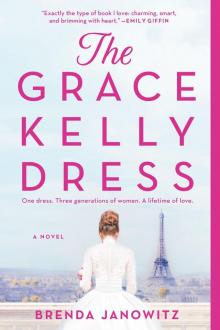 The Grace Kelly Dress
The Grace Kelly Dress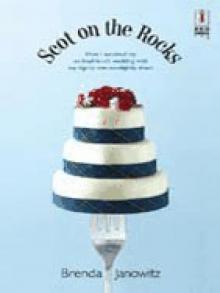 Scot on the Rocks
Scot on the Rocks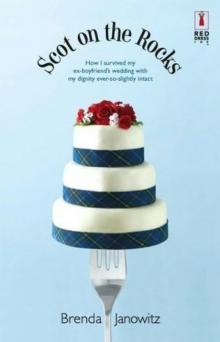 Scot on the Rocks bm-1
Scot on the Rocks bm-1 The Lonely Hearts Club
The Lonely Hearts Club Jack With a Twist bm-2
Jack With a Twist bm-2 Based On A True Story (brooke miller)
Based On A True Story (brooke miller)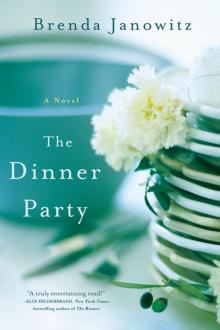 The Dinner Party: A Novel
The Dinner Party: A Novel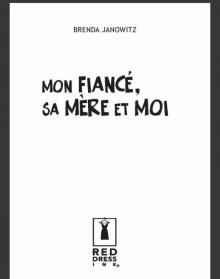 Mon fiancé, sa mère et moi
Mon fiancé, sa mère et moi Hollywood Punch
Hollywood Punch